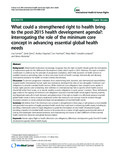| dc.description.abstract | Background
Global health institutions increasingly recognize that the right to health should guide the formulation of replacement goals for the Millennium Development Goals, which expire in 2015. However, the right to health’s contribution is undercut by the principle of progressive realization, which links provision of health services to available resources, permitting states to deny even basic levels of health coverage domestically and allowing international assistance for health to remain entirely discretionary.
Discussion
To prevent progressive realization from undermining both domestic and international responsibilities towards health, international human rights law institutions developed the idea of non-derogable “minimum core” obligations to provide essential health services. While minimum core obligations have enjoyed some uptake in human rights practice and scholarship, their definition in international law fails to specify which health services should fall within their scope, or to specify wealthy country obligations to assist poorer countries. These definitional gaps undercut the capacity of minimum core obligations to protect essential health needs against inaction, austerity and illegitimate trade-offs in both domestic and global action. If the right to health is to effectively advance essential global health needs in these contexts, weaknesses within the minimum core concept must be resolved through innovative research on social, political and legal conceptualizations of essential health needs.
Summary
We believe that if the minimum core concept is strengthened in these ways, it will produce a more feasible and grounded conception of legally prioritized health needs that could assist in advancing health equity, including by providing a framework rooted in legal obligations to guide the formulation of new health development goals, providing a baseline of essential health services to be protected as a matter of right against governmental claims of scarcity and inadequate international assistance, and empowering civil society to claim fulfillment of their essential health needs from domestic and global decision-makers. | en_US |


